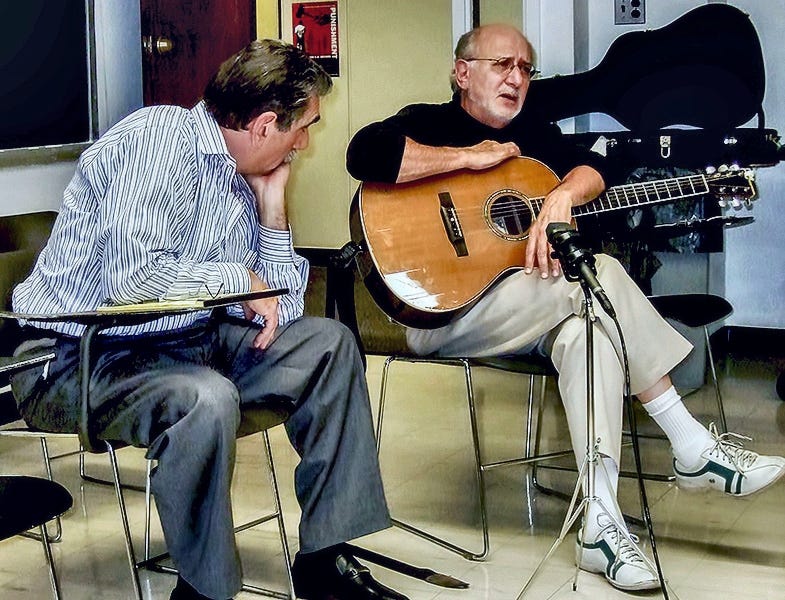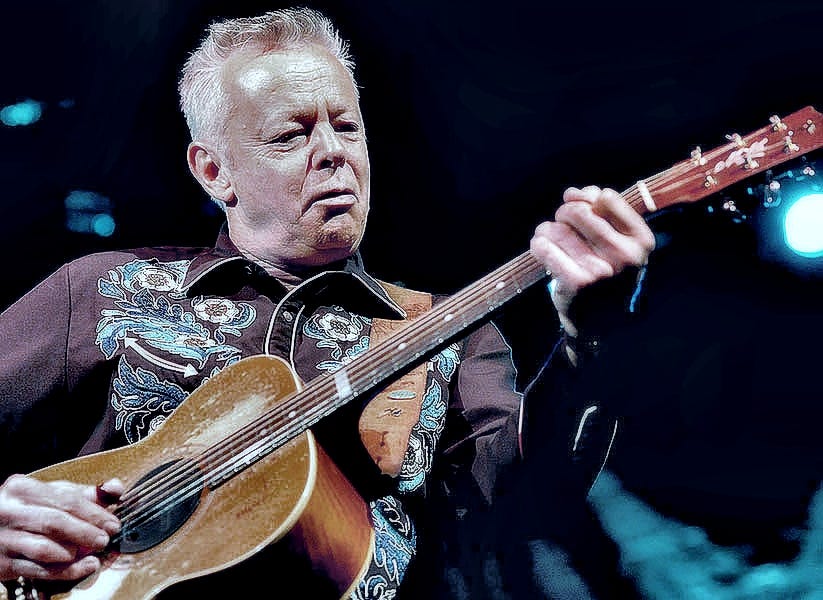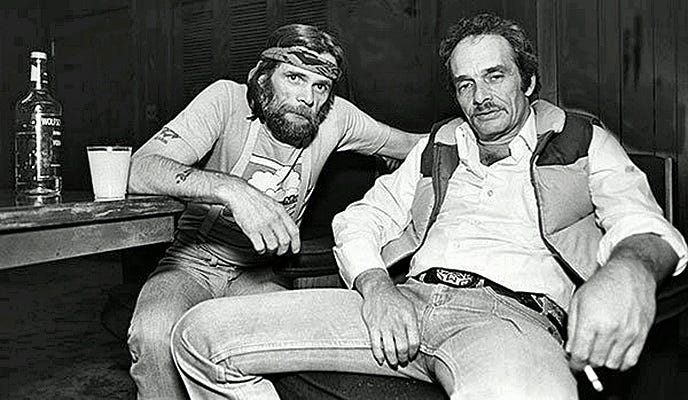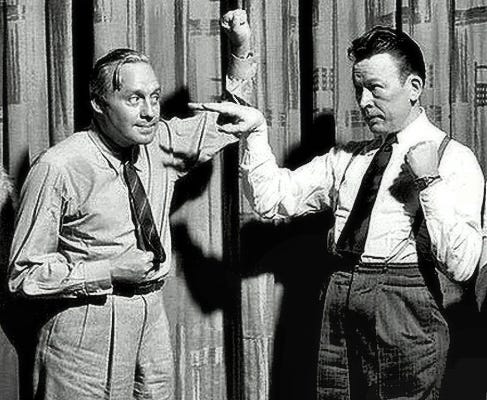Peter Yarrow, member of Peter, Paul and Mary, is 85 years old today
Peter Yarrow and his daughter, Bethany, sing in their apartment on the Upper West Side of Manhattan in 2010.
In the background is Tom Chapin, Jorma Kaukonen and Barry Mitterhoff.
Photo by Frank Beacham
Peter Yarrow is 85 years old today.
Yarrow was a singer who found fame with the 1960s folk music trio, Peter, Paul and Mary. He co-wrote (with Leonard Lipton) one of the group's most famous songs, "Puff, the Magic Dragon."
Yarrow is also a political activist and has lent his support to causes that range from opposition to the Vietnam War to the creation of Operation Respect.
Born in Manhattan, Yarrow graduated from the High School of Music and Art, which is now called LaGuardia High School. His singing career began after he graduated from Cornell University in 1959.
Soon, Yarrow met Noel "Paul" Stookey and Mary Travers in New York City's Greenwich Village, center of the American folk music revival. They were brought together by music impresario, Albert Grossman, who wanted to form a commercial folk group.
By 1962, Warner Bros. Records released the trio's first album, the eponymous Peter, Paul & Mary. The album remained in the Top Ten for ten months, in the Top Twenty for two years and sold more than two million copies. The group toured extensively and recorded numerous albums, both live and in the studio. In October, 1969, Yarrow married Mary Beth McCarthy of Willmar, Minnesota.
Paul wrote "The Wedding Song (There is Love)," as his gift for their wedding and first performed it at St. Mary's Church in Willmar.
In 2000, Yarrow co-founded Operation Respect, a nonprofit organization that brings to children, in schools and camps, a curriculum of tolerance and respect for each other's differences. On behalf of Operation Respect, Yarrow has appeared, pro bono, in areas as diverse as Hong Kong, Vietnam, Bermuda, Croatia, South Africa, Egypt, Argentina and Canada. In all, the program has been presented to many educational leaders and more than 10 million children.
In some form, the project has reached nearly one third of all elementary and middle schools in America; at least 20,000 schools, in all.
In 2003, a Congressional resolution recognized Yarrow's achievements and those of Operation Respect. The Congressional Caucus gave him a standing ovation.
In August, 2006, he met with representatives of 35 organizations, including the League of Cities, the Academy of Education, Americans for the Arts and Newspapers in Education, to unite them in a commitment to “...shifting the American educational paradigm, to educating the whole child; not just in academics but in character, heart social-emotional development. As we Jews say, `let him be a mensch first; everything else will work out'."
In 2011, Yarrow, with his adult son and daughter, made an appearance at Zuccotti Park during the Occupy Wall Street protests, playing songs such as "We Shall Not Be Moved" and a variation of "Puff the Magic Dragon."
Here, Yarrow performs “Puff, the Magic Dragon” with his daughter, Bethany, and Rufus Cappadocia in 2008.
Peter Yarrow in Bob Dylan class
Photo by Frank Beacham
Peter Yarrow: A Personal Story
It was Nov. 1, 2006 and I was taking Bob Levinson’s class on Bob Dylan at the New School in New York City. The guest for the night was Peter Yarrow of Peter, Paul and Mary.
From the moment he spoke, I liked Yarrow. He wore his heart on his sleeve. His unapologetic politics in this era of fearful political correctness was refreshing. He offered real insight into the era when Peter, Paul and Mary came of age and rose to the top of the charts.
But the year was 2006 — the era of George Bush — and one man in the class didn’t like Yarrow’s comments. So he challenged Yarrow — rather forcefully. Bob Levinson, being the great moderator that he is, let the heated exchange play out.
It was good because Peter Yarrow could hold his on and successfully defended his personal politics. It was a brilliant exchange and Yarrow quickly put the Bush defender in his place.
After class, on the street outside, I found myself standing beside Yarrow — with both of us trying to flag a taxi. Since he lived near me, we shared one home. In the cab, I felt the need to apologize to Yarrow for the right-wing attack in class.
Yarrow said he was ecstatic that it had happened. “Nothing makes me happier than that kind of attack,” he told me. “It makes my day.” He assured me that he was used to it over his long career and, in fact, welcomed it.
From that moment on, I admired Peter Yarrow much more than as a successful artist. He’s the real thing and lives his life exactly as he believes is right.
It’s so refreshing in this divided era of phony “hipsters” and fearful corporate believers, to meet a man who still has and lives his values and ethics.
Tommy Emmanuel is 68 years old today.
Emmanuel is an Australian guitarist and occasional singer, best known for his complex fingerstyle technique, energetic performances and the use of percussive effects on the guitar.
Born in 1955, Emmanuel received his first guitar in 1959 at age four, being taught by his mother to accompany her playing lap steel guitar. At the age of seven, he heard Chet Atkins on the radio. He vividly remembers this moment and says it greatly inspired him.
By the age of six, in 1961, he was a working professional musician. Recognizing the musical talents of Tommy and his brother, Phil, their father created a family band, sold the family home and took his family on the road.
With the family living in two station wagons, much of Emmanuel’s childhood was spent touring Australia with his family, playing rhythm guitar and rarely going to school. The family found it difficult living on the road. They were poor but never hungry, never settling in one place. His father would often drive ahead, organize interviews, advertising and find a local music shop where they'd have an impromptu concert the next day.
Eventually the New South Wales Department of Education insisted that the Emmanuel children needed to go to school regularly. After his father died in 1966, the family settled in Parkes. Tommy eventually moved to Sydney, where he came to be noticed nationally when he won a string of talent contests in his teen years.
By the late 1970s, he was playing drums with his brother, Phil, in the group Goldrush as well doing session work on numerous albums and jingles. He gained further prominence in the late 1970s as the lead guitarist in, The Southern Star Band, the backing group for vocalist Doug Parkinson.
During the early 1980s, he joined the reformed lineup of leading 1970s rock group Dragon, touring widely with them, including a 1987 tour with Tina Turner. He left the group to embark on a solo career.
Throughout his career, Emmanuel has played with many notable artists including Chet Atkins, Eric Clapton, Sir George Martin, Air Supply, John Denver, Les Paul, Edgar Cruz and Doc Watson. While he has never had formal music training, his playing ability has won him fans from all over the world. He is known to play percussion parts on the body of his guitar.
As a solo performer, he never plays to a set list and uses a minimum of effects. He usually completes recordings in one take.
Emmanuel frequently uses his left thumb to fret bass notes on the 5th and 6th strings as well as playing chords such as A and E with just two fingers. He uses a thumb pick mostly, a flat pick or just fingers. He also integrates amongst his trademark blazing runs and kaleidoscopic chord progressions a quick note/chord "dive" — imitating a tremolo system effect on his fixed-bridge acoustic guitars.
He presses the palm of his right hand against the body of the guitar directly above the fret board close to the neck joint while maintaining forward pressure with his left (fretting) hand.
Here, Emmanuel performs “Classical Gas”
Photo by Patrick Swirc
Clint Eastwood is 93 years old today.
A film actor, director, producer, composer, pianist and politician, Eastwood first came to prominence as a supporting cast member in the TV series, Rawhide (1959–1966). He rose to fame for playing the “Man with No Name” in Sergio Leone's Dollars trilogy of spaghetti westerns (A Fistful of Dollars, For a Few Dollars More, and The Good, the Bad and the Ugly) during the late 1960s.
He also played Harry Callahan in the Dirty Harry films (Dirty Harry, Magnum Force, The Enforcer, Sudden Impact, and The Dead Pool) throughout the 1970s and 1980s. These roles, among others, have made him an enduring cultural icon of a certain type of masculinity.
For his work in the films, Unforgiven (1992) and Million Dollar Baby (2004), Eastwood won Academy Awards for Best Director and Producer of the Best Picture, as well as receiving nominations for Best Actor.
These films in particular, as well as others including Play Misty for Me (1971), Thunderbolt and Lightfoot (1974), The Outlaw Josey Wales (1976), Escape from Alcatraz (1979), Tightrope (1984), Pale Rider (1985), Heartbreak Ridge (1986), In the Line of Fire (1993), The Bridges of Madison County (1995) and Gran Torino (2008), have all received commercial success and critical acclaim.
Eastwood's only comedies have been Every Which Way But Loose (1978) and its sequel, Any Which Way You Can (1980), which are his two most commercially successful films after adjustment for inflation.
In addition to directing many of his own films, Eastwood has also directed films in which he did not appear, such as Mystic River (2003) and Letters from Iwo Jima (2006), for which he received Academy Award nominations. He directed Changeling in 2008.
He has received considerable critical praise in France, including for several films which were not well received in the United States, and he has been awarded two of France's highest honors. In 1994, he became a recipient of the French Republic's Commandeur of the Ordre des Arts et des Lettres and, in 2007, he was awarded the Légion d'honneur medal.
In 2000, he was awarded the Italian Venice Film Festival Golden Lion for lifetime achievement.
Since 1967, Eastwood has run his own production company, Malpaso, which has produced all except four of his American films. He also served as the nonpartisan mayor of Carmel-by-the-Sea, California from 1986 to 1988.
Eastwood favors jazz (especially bebop), blues, classic rhythm and blues, classical, and country-and-western music. His favorite musicians include saxophonists Charlie Parker and Lester Young, pianists Thelonious Monk, Oscar Peterson, Dave Brubeck, Fats Waller and Delta bluesman Robert Johnson.
He is also a pianist and composer. Jazz has played an important role in Eastwood's life from a young age and, although he never made it as a professional musician, he passed on the influence to his son, Kyle Eastwood, a successful jazz bassist and composer.
Eastwood has eight children by six different women, although he has only married twice.
Here is a video featuring 170 of Eastwood’s great film quotes
About ten years ago, my friend Tony Garnier, Bob Dylan’s bass player and music director, gave me a CD that he performed on many years earlier. He was quite proud of it.
Called Show Me The Steps, it was recorded in the 1980s with Billy Marlowe, an unknown musician, whose story resembles that of Sixto Rodriguez in some ways. Unlike Rodriguez, Marlowe died at 53. He lived an itinerant lifestyle and went to Canada to avoid the Vietnam draft. He was jailed for two years when he returned home.
Through it all, Marlowe wrote songs and kept writing them. He hauled his guitar (nicknamed “Louise”) thru a lot of bad neighborhoods. Once, he had to buy “her” back from druggies who swiped Louise while he slept in some dark corner.
In 1983, Marlowe responded to an ad in the Village Voice placed by Steve Satterwhite, who was looking for an artist to test run his new recording studio just blocks away from CBGB’s and the Lone Star Cafe on East Fourth Street. Over the next year, Marlowe recorded an album.
He somehow gathered some of the best musicians in New York City to help out. Satterwhite and Stephen Gaboury did the recording. Playing was Tony Garnier, of course. And the late guitarist, Jeff Golub, who often played with Tony at Upper West Side clubs. Also, Lincoln Goines, Kenny Kosek, Shawn Colvin, Gary Bristol and many others assisted.
Billy was always astounded and often reduced to tears when a musician added a new note that was just right for his music. Tony, years later, was moved as well by the incredible quality of Marlowe’s music. He gave me the CD and said listen carefully. I would be amazed. I was.
Marlowe’s songs are bittersweet poems and he delivers them in a voice that carries a truckload of emotion. This cut from the CD, “Mama Was Right,” tugs at the heartstrings as the violin soars into the blue.
Thanks Tony Garnier and Paul Kerr!
Your can order the album at: https://amzn.to/2ZS0lLG
Walt Whitman was born 203 years ago today.
A poet, essayist and journalist, Whitman was also a humanist — a part of the transition between transcendentalism and realism, incorporating both views in his works. He is among the most influential poets in the American canon, often called the father of free verse.
His work was very controversial in its time, particularly his poetry collection, "Leaves of Grass," which was described as obscene for its overt sexuality.
Born on Long Island, Whitman worked as a journalist, a teacher, a government clerk and — in addition to publishing his poetry — was a volunteer nurse during the American Civil War. Early in his career, he also produced a temperance novel, Franklin Evans (1842).
Whitman's major work, Leaves of Grass, was first published in 1855 with his own money. The work was an attempt at reaching out to the common person with an American epic. He continued expanding and revising it until his death in 1892. After a stroke towards the end of his life, he moved to Camden, New Jersey, where his health further declined.
He died at age 72 and his funeral became a public spectacle.
Whitman was concerned with politics throughout his life. He supported the Wilmot Proviso and opposed the extension of slavery generally. His poetry presented an egalitarian view of the races, and at one point he called for the abolition of slavery, but later he saw the abolitionist movement as a threat to democracy.
Johnny Paycheck and Merle Haggard
Johnny Paycheck was born 85 years ago today.
Paycheck was a country music singer and Grand Ole Opry member most famous for recording the David Allan Coe song, "Take This Job and Shove It." He achieved his greatest success in the 1970s as a major force in country music's "Outlaw Movement" popularized by artists such as Billy Joe Shaver, David Allan Coe, Waylon Jennings, Willie Nelson and Merle Haggard.
In the 1980s, his music career suffered from his problems with drugs, alcohol and legal difficulties. He served a prison sentence in the early 1990s, but his declining health effectively ended his career in early 2000.
Born in Greenfield, Ohio as Donald Lytle, he was performing in talent contests by the age of nine. He took a job with country music legend George Jones, playing bass and steel guitar. He later co-wrote Jones' hit song, "Once You've Had the Best."
In 1964, Lytle changed his name legally to Johnny Paycheck, taking the name from Johnny Paychek, a top ranked boxer from Chicago who once fought Joe Louis for the heavyweight title. The name was often seen as a pun on the name of the popular country singer, Johnny Cash.
Paycheck was a tenor harmony singer with numerous hard country performers in the late 1950s and early 1960s. These included Ray Price. Paycheck, along with Willie Nelson, worked in Price's band, the Cherokee Cowboys. He is featured as a tenor singer on recordings by Faron Young, Roger Miller and Skeets McDonald.
All of these recordings are recognizable by their honky tonk purism. The recordings shun vocal choruses and strings that became known as the "Countrypolitan" sound in favor of steel guitar, twin fiddles, shuffle beats, high harmony and self-consciously miserable lyrics.
As George Jones' tenor singer, Paycheck has been credited with the development of Jones' unique vocal phrasing.
After the year 2000, his health would only allow for short appearances. Suffering from emphysema and asthma after a lengthy illness, Paycheck, 64, died at Nashville's Vanderbilt University Medical Center in 2003.
A tribute album, Touch My Heart: a Tribute to Johnny Paycheck, was released in 2004 on the Sugar Hill Label. Produced by Robbie Fulks, the album features George Jones, Marshall Crenshaw, Hank Williams III, Al Anderson, Dallas Wayne, Neko Case, Gail Davies and Fulks himself covering some of Paycheck's best-known songs.
Here, Paycheck performs “The Outlaw’s Prayer”
Fred Allen and Jack Benny
Fred Allen, radio comedian, was born 128 years ago today.
Allen was a comedian whose absurdist, topically pointed radio show (1932–1949) made him one of the most popular and forward-looking humorists in the Golden Age of American radio. His best remembered gag was his long-running mock feud with friend and fellow comedian, Jack Benny.
Radio historian John Dunning (in On the Air: The Encyclopedia of Old-Time Radio) wrote that Allen was radio's most admired comedian and most frequently censored. A master ad libber, he often tangled with his network's executives (and often barbed them on the air over the battles), while developing routines whose style and substance influenced fellow comic talents, including Groucho Marx, Stan Freberg, Henry Morgan and Johnny Carson.
His avowed fans also included President Franklin D. Roosevelt and novelists, William Faulkner, John Steinbeck and Herman Wouk, who began his career writing for Allen.
Taking one of his regular late night strolls up New York's West 57th Street on Saturday night, March 17, 1956, Allen suffered a heart attack and died at the age of 61.
Here, Allen is pictured in his comedic feud with Jack Benny
.Verblasst, The Hague, Netherlands
Photo by Nicolas Alexander Otto










